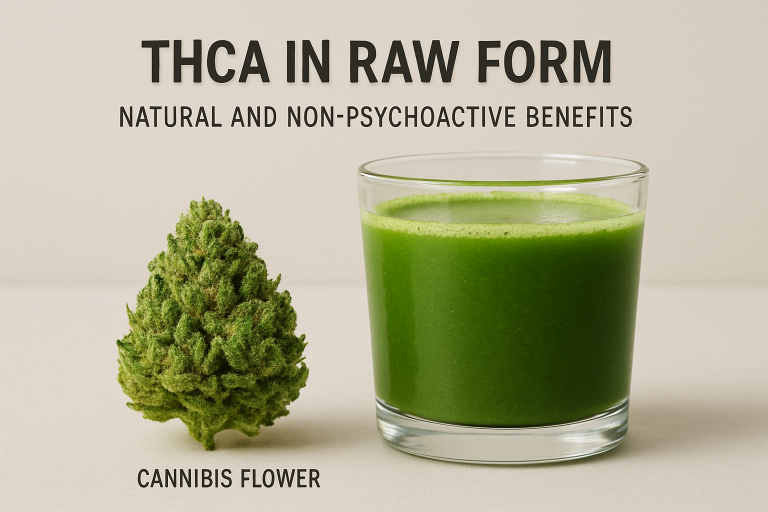THCA (tetrahydrocannabinolic acid) is gaining unprecedented attention among wellness seekers and individuals interested in alternative medicine as word spreads about cannabinoid therapies that do not produce psychoactive effects. Found naturally in the raw cannabis plant, THCA is the acidic precursor to THC, but remains non-psychoactive when unheated or unprocessed.
This means that when consuming raw cannabis, users do not experience the characteristic “high” associated with THC. For individuals seeking to explore the benefits of cannabinoids while maintaining mental clarity, THCA flower offers an innovative natural solution with the potential to complement both traditional and holistic approaches to health.
As cannabis-based therapies rise in popularity, there is growing curiosity about the unique properties that make THCA a subject of scientific study and personal experimentation. Understanding its in-depth benefits and potential uses is essential for those who seek comprehensive wellness, whether out of curiosity or in pursuit of a targeted health regimen.
Unlike its decarboxylated counterpart THC, which is the primary intoxicating compound produced after cannabis is heated, THCA stays non-intoxicating in its natural state. This distinction is crucial for people who desire the cannabinoid benefits of cannabis without mind-altering effects. Early research, together with a growing body of firsthand reports, strongly suggests that THCA-rich products might help address stubborn health issues ranging from chronic inflammation to more subtle neurological imbalances.
Studies are beginning to connect THCA with reduced inflammation, neuroprotection, and appetite stimulation—demonstrating a surprising breadth of potential. The emerging science provides new hope for those struggling with chronic illness or those who seek to optimize overall well-being through plant-based medicine. Even for people with no prior experience using cannabis products, THCA’s flexibility in raw and processed forms allows for tailored approaches—be it ingesting, applying, or supplementing—to suit different preferences and needs.
This makes it appealing not only as a supplement but as a part of a holistic lifestyle. As such, THCA is carving out an important niche among those who wish to harness the healing powers of cannabis without experiencing a high.
By genuinely exploring the range of benefits and uses, today’s consumer can make more informed decisions for their health journey. Whether your interest stems from medical necessity or simply from a desire to approach preventive care more naturally, understanding the nuances of THCA broadens your choices.
In this article, we discuss in detail the benefits, evidence, and practical applications of THCA flower for those seeking a natural and potentially revolutionary alternative to conventional medicine. It is important to remember that, as with all cannabinoids or herbal supplements, consulting with healthcare professionals, especially when managing pre-existing health conditions or medications, is highly advised. Discoveries are being made regularly, so staying informed about up-to-date research is key for safe and effective integration.
Health Benefits of THCA Flower
Ongoing scientific research and a growing body of anecdotal evidence present a compelling health profile for THCA flower. Unlike traditional THC-focused products, the non-intoxicating nature and complex cannabinoid composition of THCA offer a different kind of therapeutic profile that warrants attention.
It is this new dimension of cannabis medicine that has begun garnering attention from both researchers and patients alike. The most notable health-related benefits that THCA is currently associated with include:
Anti-Inflammatory Properties
THCA is believed to exhibit potent anti-inflammatory characteristics, as suggested by early-stage research and preliminary clinical observations. One pivotal study published in the British Journal of Pharmacology found that THCA was effective at reducing inflammatory responses in animal models.
This has broad implications for those managing chronic inflammatory conditions like arthritis, fibromyalgia, and inflammatory bowel diseases, who often seek relief beyond the limited scope of conventional pharmaceutical treatments.
By potentially moderating immune responses and quieting inflammation, THCA offers an appealing avenue for self-care and management of daily discomfort. The idea that one can address chronic inflammation naturally, with minimal side effects, empowers individuals to look for less risky alternatives alongside standard medical care. Despite the promise, further clinical studies are required to confirm dosage, safety, and efficacy in humans.
Neuroprotective Effects
The neuroprotective potential of THCA is especially compelling for people concerned about long-term brain health, cognitive decline, or neurodegenerative diseases. Researchers have begun to uncover evidence that THCA may play a role in reducing oxidative stress and inflammation in the brain, two key factors in the progression of neurological diseases.
Findings from the British Journal of Pharmacology highlighted THCA’s potential to help shield brain cells from damage, which is of particular interest in conditions like Alzheimer’s and Parkinson’s disease—both of which are currently difficult to manage using existing drugs. The prospect of slowing the onset or progression of these illnesses is exciting and may offer a sense of empowerment for those at risk or facing symptoms.
Although it is too soon to call THCA a cure, these early results point to a future where plant-based neuroprotection could one day supplement or even improve upon current strategies for maintaining brain health.

Anti-Nausea and Appetite Stimulation
Another area in which THCA has shown promise is its potential as an antiemetic (anti-nausea) agent and appetite stimulant. This is especially pertinent for cancer patients undergoing chemotherapy, individuals struggling with appetite loss from chronic illnesses, or anyone experiencing nausea from other medications.
THCA may help alleviate acute and persistent nausea, while also promoting a healthy appetite, making it a valuable option for enhancing quality of life. Numerous real-world case studies and patient testimonials describe reductions in nausea and renewed interest in eating; however, larger clinical trials are necessary to substantiate these initial claims fully.
If these effects continue to be validated, THCA could provide important supportive care in medical settings, allowing for more comfortable management of treatment side effects and chronic symptoms.
Practical Uses of THCA Flower
One of the standout advantages of THCA flower is its unique versatility and variety of practical applications. Unlike THC products, THCA can be consumed in multiple ways to suit the distinct needs and lifestyles of different users. The method of consumption directly influences its effects, allowing for the tailoring of experiences and benefits to individual preferences.
Whether seeking ongoing wellness, targeted symptom management, or integration with an active lifestyle, users can select the format that best suits their needs. Below are several of the most common and effective ways to benefit from THCA flower:
Juicing
Juicing fresh cannabis leaves and flowers is an innovative and effective way to retain the high THCA content available in raw plant material. By consuming cannabis in its raw, unheated form—such as via juices or smoothies—users access the health benefits of THCA without any psychoactive effects that might occur with heated, decarboxylated THC.
This method allows for relatively high doses of cannabinoids to be consumed as part of a regular diet, which may be particularly appealing for those seeking preventive or holistic therapy.
The raw taste might require acclimatization, but many enthusiasts report increased energy, enhanced well-being, and symptom relief with consistent use. Juicing also fits easily into daily routines alongside other wellness drinks, making it highly accessible for most people who want to maximize health benefits from whole-plant nutrition.
Topicals
THCA-infused creams, balms, or salves offer targeted relief when applied directly to the skin. This delivery method bypasses the digestive system, allowing THCA to penetrate directly into affected tissues and offer highly localized benefits for pain and inflammation.
For those dealing with arthritis, repetitive stress injuries, or athletic strains, THCA topicals make it possible to address discomfort precisely where it is needed without ingesting cannabinoids. Many users prefer topicals due to their convenience, rapid action, and the absence of psychoactive or systemic effects.
These products are often formulated with soothing botanicals and natural skin-care agents, further amplifying their overall therapeutic value.
Tinctures
Tinctures are a popular and practical way to consume THCA in a discrete, highly controlled manner. THCA tinctures are typically administered under the tongue, allowing for rapid absorption into the bloodstream and a swift onset of effects. Dosage can be precisely controlled using droppers, making it easy to start with a low dose and gradually adjust as needed for personal comfort and response.
Tinctures are especially valued by those who need flexible dosing throughout the day or who value the convenience of a portable, shelf-stable solution. This method is also sugar-free and can be incorporated into food or drinks for added flexibility.
Capsules
For those who desire maximum simplicity and consistent dosing, THCA capsules offer a straightforward supplementation approach. Each capsule delivers a fixed amount of THCA, making it easy to manage intake without guesswork or preparation time.
Capsules are ideal for people who want the medicinal benefits of cannabinoids without the taste, odor, or required preparation involved in other methods. They easily fit into morning or evening supplement routines. They are compatible with other wellness products commonly used to support health and well-being, making sustained cannabinoid therapy more accessible to a broader audience.
Conclusion
As scientific and medical interest in THCA flower continues to deepen, our collective understanding of its diverse medicinal properties is growing rapidly. From powerful anti-inflammatory and neuroprotective effects to promising anti-nausea and appetite-stimulating properties, THCA offers a potentially game-changing alternative for patients who prefer to avoid the intoxicating effects of THC yet wish to leverage the healing capabilities of cannabis.
Although more rigorous, large-scale clinical trials are needed to confirm early findings and guide best practices, current research and a rapidly expanding collection of patient testimonials together indicate that exploring raw cannabis and THCA-rich products as part of a thoughtful, integrative health plan could yield substantial benefits.
Staying current with ongoing studies, advice from medical professionals, and firsthand experiences is critical. For further reading on new and developing cannabis research, visit the British Journal of Pharmacology’s coverage of cannabinoids and their evolving role in health and wellness.
